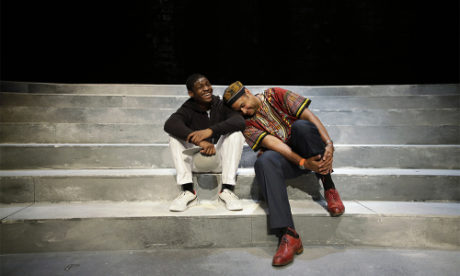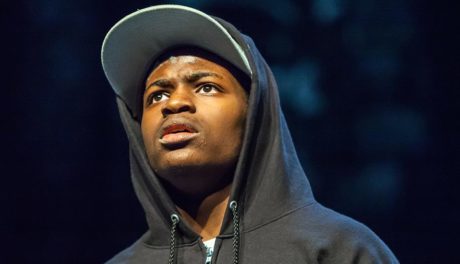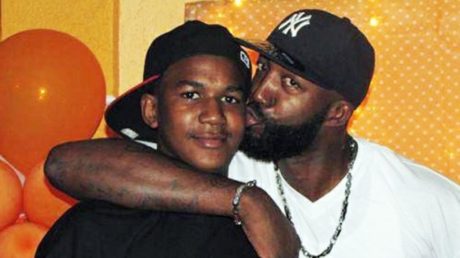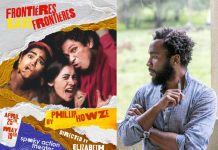“Without these people, I would just be another black boy passing on the street”
“The Ballad of Trayvon Martin by Rajendra Ramoon Maharaj and Thomas J. Soto is a poetic docudrama inspired by the death of teenager Trayvon Martin inside a private gated community in Florida. Martin was shot and killed by George Zimmerman, a white neighborhood watch volunteer. With Florida’s now famous “Stand Your Ground Law” in place, Zimmerman was unsurprisingly acquitted in the murder trial. Trayvon was clearly not the dangerous thug that the shooter made him out to be. Instead of a gun, he held a bag of Skittles. His dream was to one day become a pilot. Instead, it is his legacy to be known by millions of Americans as a symbol of just how tough it is to be a young black man in this country.” –Neal Newman, in his DCMetroTheaterArts review of The Ballad of Trayvon Martin
Henrik: You are only 16 and already starring in a major production at the New Freedom Theatre, Pennsylvania’s oldest African American theatre. Tell us about the influences that inspired you to pursue acting and keep moving forward in a tough world—both in the streets and on theater stages.
Amir: Seeing people like Denzel Washington and Sidney Poitier, symbols of the African-American culture and movements in the United States, made me very fond of theatre and the arts. Being able to portray stories, characters, and lessons gives me a sense of purpose that inspires me to appreciate and take part in theatre and a new sense of the world.

You grew up in a non-traditional family with your grandmother and great-grandmother, both of whom seem to have influenced you as a young person and an actor. Tell us about the first time you realized that you liked acting and how those two women shaped your life.
When I was around ten, my grandmother randomly rode me to a sample class at Freedom Theatre in about 2010. I was very hesitant to take part in the class and open myself up to acting, but once they let the students on stage, it was an instant love. Being on such a powerful and historic stage gave me that sense of purpose that drives me to be an actor. My grandmother and great-grandmother have always supported me in whatever I pursued, so I had an extra push in my art that allowed me to be steps ahead and really appreciate acting.
You said that the predominately African American New Freedom Theatre helped you excel as an artist. Could you give some examples?
Being around so many beautiful, spiritual, and talented people of the same color as me gave me a humongous sense of belonging. There is such an intimacy and family-like aura that surrounds you when talented black performers come together in one of the last African-American theatres in America to expose their great art to the world and especially the community. It always feels like you’re united as the vision of your ancestors who have endured years of struggle, injustice, and prejudice. I have always held this knowledge close to me and accredit it to one of the many instances that have made me the actor I am today.
Could you describe the training that you experienced in the process of working on The Ballad of Trayvon Martin? What did you learn about yourself?
While not directly taught during the rehearsal process, just listening and watching the many talented actors taught me so much. The ambition of these people around me to really project the life of Trayvon Martin was staggering. People that have more experience than me felt like family and people I could consider great friends, mentors, and teachers.
The play itself taught me to cherish every moment of my life, for it can be taken away at any moment. Life is not fair, so I know now that I have to put my lessons and wisdom into the world whenever I can.

We saw you on stage as a child, a teenager, a member of a group of friends playing ball, a frightened young man facing George Zimmerman’s gun, a victim, a visitor in the place of the dead, and as a polished speaker, delivering an impassioned and sophisticated concluding speech to the audience. Describe the shifting mindsets of Trayvon Martin that you presented and the processes you had to go through to portray such a multi-faceted character.
It is most definitely a challenge. Having to drop into the role every night and grip the deep places inside of me to make the performance give as much justice to Trayvon, takes a lot out of me. I usually relate the actions and scenes of Trayvon to similar situations I experienced in my life. This makes it so surreal and a time for me to reflect on myself as a teenage boy.
How did any of the scenarios that Trayvon experienced in his life relate to aspects of your own life, especially against the backdrop of all the many young people of color that have been killed in the U.S. over the last few years?
Being the same age as Trayvon, it really affects me. It makes me sick that people still in this day and age, judge by what someone wears or where he is from. As a nation and a society, we must overcome this mental disposition of putting people in a box. As a united world, this cannot be something carried on as it is dangerous and limits the intellect and potential of so many black and minority kids today.
What are your goals for your future?
For a very long time my goal was to study Aerospace Engineering or Military Science and then join the military as an officer, and then pursue a career as an FBI SWAT member. Yet, after going through the experience of portraying a powerful message through The Ballad of Trayvon Martin, theatre has been passing my mind as something I would like to pursue. When the time comes, I will use my discretion to choose my path, depending on the opportunities that arise and what will be the most beneficial for myself and the messages I want to convey.
If you had the opportunity to address black teenagers who may be angry, especially toward authority figures such as parents, teachers, and police officers, how would you tell them to express their thoughts and feelings in such a way that they don’t endanger themselves in one of the most deadly societies for minority members in the Western world?

I would tell them, “Listen! Understand that racial division is just that, a division. You can’t protest with Black Lives Matter and then continue the next day as if nothing had happened. If you are angry, let your lifetime goal be to make the world understand what you believe in your own way. If that way would be writing, protesting, performing, or whatever is right for you, put your frustration into that. Anger can be beautiful or horrible. It is up to you how you use your anger.”
Is there anything else you would like to share?
I would just like to thank my role models like [rapper] Kendrick Lamar, [football player] Antonio Brown, [actors] Sidney Poitier and Denzel Washington—and all the major influences in my life, especially my grandmother and great-grandmother. These people do what they can every day to empower those who struggle and find passion in what they do. Without these people I would just be another black boy passing on the street.
Running Time: Two hours and 15 minutes, with an intermission.
The Ballad of Trayvon Martin plays through this Sunday May 22, 2016 at New Freedom Theatre-1346 Broad Street (Broad and Master), in Philadelphia, PA. For tickets call the box office at (888) 802-8998, or purchase them online.
LINKS:
The Ballad of Trayvon Martin reviewed by Neal Newman on DCMetroTheaterArts.
Watch a TV interview with Amir Randall and Playwright and Director Rajendra Ramoon Maharaj.





